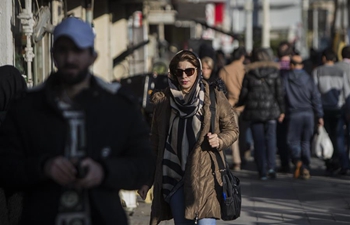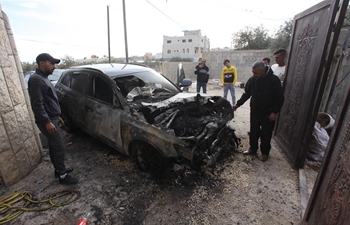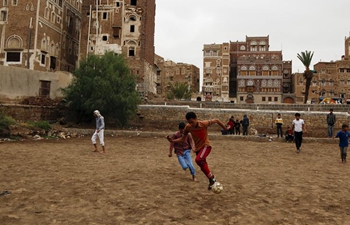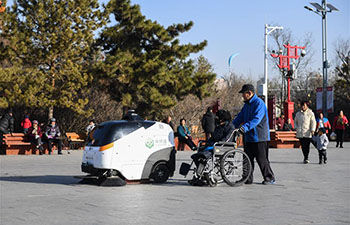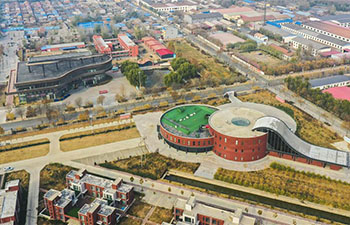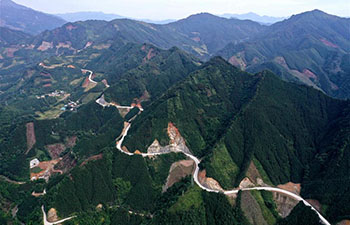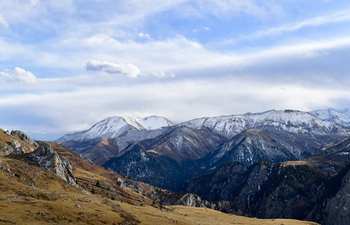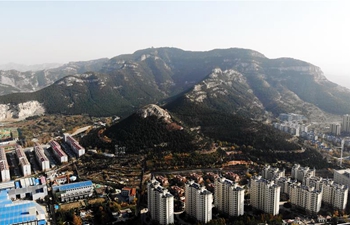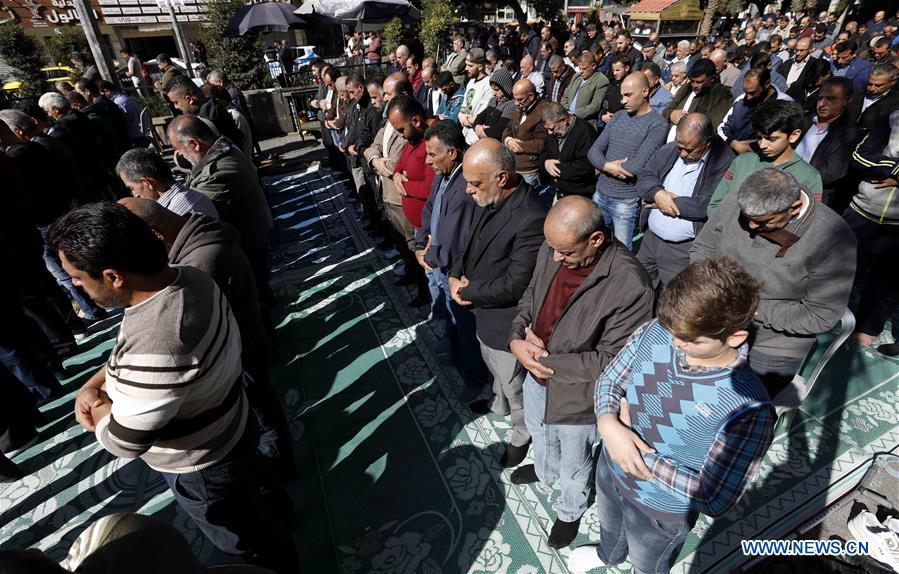
Palestinian Muslim worshippers perform Friday prayers in the center of the West Bank city of Nablus, Nov. 22, 2019. Palestinians' fear for a possible annexation of large areas of the West Bank increased after U.S. Secretary of State Mike Pompeo recently said the U.S. administration considers "the establishment of Israeli civilian settlements in the West Bank is not, per se, inconsistent with international law." (Photo by Ayman Nobani/Xinhua)
RAMALLAH, Nov. 21 (Xinhua) -- Palestinian farmer Yousef Asmar, who lives in a remote village in the West Bank's Jordan Valley, worries about what the future may hold for him and his family, amid threats of being under the Israeli sovereignty.
Asmar, 42, lives in Khirbet Makhoul village, and earns his living from herding and farming, like the majority of the area's residents.
He said he is gravely concerned with the repeated Israeli remarks over its intention to impose its sovereignty over the Jordan Valley, which may affect the future that awaits him and his family.
Over the past years, Asmar said he has seen about 20 years to leave the village, "due to Israeli measures and harassment."
He told Xinhua that the possibility of Israel declaring its sovereignty over the area "means completely destroying and forcibly displacing us."
He said he is attached to the small lot of land, which is about 0.65 square km where he plants wheat and barley.
"I have no other job. My capital and my main source of living is my land," he said. "If they force us to leave or prohibit us from planting, we will be displaced."
He went on complaining about the lack of irrigation water due to Israeli restrictions on Palestinians' water consumption, which forces farmers to limit their agricultural activity.
He said he believes this is part of an Israeli scheme to evict Palestinians from the Jordan Valley.
The Palestinian Jordan valley is 1,622 square km and constitutes 28 percent of the area of the West Bank. It is home to nearly 65,000 Palestinians, including the population of Jericho city, which is 2 percent of the Palestinian population, according to official data.
For Palestinians, the Jordan Valley, which is located in the east of the West Bank, on the borders with Jordan, is considered a vital and integral part of their future state for its strategic location and fertile lands.
Israeli Prime Minister Benjamin Netanyahu, during his last electoral campaign in September, said that Israel will annex the Jordan Valley and impose its sovereignty over West Bank settlements for security concerns in the long run.
Around half a million Israeli settlers live in the West Bank settlements, including East Jerusalem, according to Israeli sources.
UN data show there are 31 Jewish only settlements built in the Jordan Valley, most of which are agriculture based, and resided by some 8,000 settlers. Since its occupation in 1967, Israel has set up some 90 military posts in the area and forcefully evicted around 50,000 Palestinians.
Israeli human rights group B'Tselem said that Israel has declared about 20 percent of the area as natural reserves, taken over large areas in the north of the valley to build the separation wall, and used 56 percent of its area for military purposes.
Palestinians generally fear that Israel will take over more than 60 percent of the West Bank area, by confiscating lands that have been put under its control in the 1993 interim Oslo Accords.
Under the accords, signed between the Palestine Liberation Organization and the Israeli government in 1993, the West Bank was divided to three areas: Area A under Palestinian control, Area B under Palestinian control and Israeli security control, which makes up around 22 percent of the West Bank, and Area C under full Israeli control which takes up over 60 percent of the West Bank's 5,655 square km area.
Palestinian land and settlement expert Khalil Tafakjiwarn said that Israel's interest could mean imposing its control over the entire eastern part of the West Bank and cutting off all geographical continuity with the rest of the territory.
Tafakji told Xinhua that he believes Israel will seek to surround Palestinian villages and communities in the Jordan Valley and will not allow its expansion, while it puts Bedouin communities spread across the area between East Jerusalem and the Dead Sea in one place to take over their lands.
"The annexation is aimed at exploiting large agricultural areas and allowing Israel to invest in them, building more settlements and legalizing settler outposts, not for security reasons as they claim, because it already has a peace agreement with Jordan," he explained.
Palestinian Authority's settlement watchdog said that 19 communities, home to 3,700 Palestinians, in the Jordan valleys are at risk of forcible displacement.
Palestinians' fear for a possible annexation of large areas of the West Bank increased after U.S. Secretary of State Mike Pompeo recently said the U.S. administration considers "the establishment of Israeli civilian settlements in the West Bank is not, per se, inconsistent with international law."
Many believe that Pompeo's statements will encourage Israel to press ahead with its former threats.
Israeli settlement activity is deemed illegal by most world powers and under international law. It is considered one of the issues that hindered the peace talks between Palestinians and Israelis.
(Mohammed Abu al-Rob and Fatima AbdulKarim in Ramallah, and Emad Drimly in Gaza contributed to the story.)




